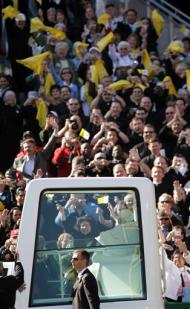By Eric Gorski
The Associated Press
April 17, 2008
http://ap.google.com/article/ALeqM5j7CMHl_nRqEaAwSLE_odoujTS4FgD903MDKG0
WASHINGTON (AP) — Pope Benedict XVI praised America as a land of opportunity and hope Thursday as he celebrated the first public Mass of his U.S. pilgrimage, but he lamented that the nation's promise fell short for Indians and blacks.
But, he said, hope for the future "is very much a part of the American character."
Tens of thousands of worshippers filled Washington Nationals stadium on a clear spring day and cheered Benedict as he arrived in a white popemobile, standing in the back and waving.
 |
| The Popemobile, with Pope Benedict XVI aboard, makes his entrance for a Mass, Thursday, April 17, 2008, at Washington Nationals baseball Park in Washington. Photo by Pablo Martinez Monsivais |
A crowd of 46,000 was expected, and the demand for tickets doubled the supply, organizers said.
The pope, wearing scarlet vestments, led the service from an altar erected in centerfield of the recently inaugurated baseball stadium.
"Americans have always been a people of hope," he said. "Your ancestors came to this country with the experience of finding new freedom and opportunity," Benedict said.
 |
| Pope Benedict XVI waves from the Popemobile as he makes his entrance for the Mass, Thursday, April 17, 2008, at Washington Nationals baseball Park in Washington. Photo by Pablo Martinez Monsivais |
"To be sure, this promise was not experienced by all the inhabitants of this land; one thinks of the injustices endured by the native American peoples and by those brought here forcibly from Africa as slaves."
He turned for a third day to the clergy sex abuse scandal that rocked the American church, saying "no words of mine could describe the pain and harm inflicted by such abuse."
 |
| Pope Benedict XVI arrives for his Papal Mass in the Popemobile, Thursday, April 17, 2008, at Washington National baseball Park in Washington. Photo by Gerald Herbert |
He called for healing and reconciliation and assistance to the victims.
Barbara and Michael Loh of Williamsburg, Va., sat alone in the stands taking in the scene. They were among the first to arrive.
"I've been Catholic all my life and ... my dream has always been to see the pope," said Barbara Loh, tearing up.
At 5:45 a.m., more than four hours before the Mass, it was standing-room only on subways. Vendors hawked Vatican flags and souvenir buttons, but there were few takers as people hurried toward the stadium.
For others, there was nothing more important than getting in, and many people without tickets stood outside the subway station with signs pleading for extras.
Patty Trail, 54, pastoral associate at a church in Virginia Beach, Va., drove overnight to bring two priests to the Mass. She didn't have a ticket but said she was happy to at least be in the vicinity of the pope.
"Just to be out here, just to be in the presence," she said. "D.C. feels different."
A number of lawmakers who support the right of a woman to have an abortion attended the Mass, including House Speaker Nancy Pelosi and Sen. John Kerry, the former Democratic presidential candidate. During the 2004 campaign, several bishops questioned whether he should receive communion because of his stand on abortion.
On Wednesday, Benedict spent the first full day of his U.S. journey sharing a platform with President Bush and laying out his analysis of the American church to the nation's bishops.
Before Benedict's arrival, polls showed most Americans knew little or nothing about him. Those who have watched him so far have found a German-born pontiff who speaks excellent English, appears vigorous for his 81 years, mostly prefers script to spontaneity and displays a keen sense of the critical issues facing his 65-million member American flock.
One of larger questions hanging over Benedict's first U.S. trip as pontiff was whether and how he would address the clergy sex abuse scandal, which has claimed thousands of victims, cost the church more than $2 billion in court costs and settlements and led six dioceses to declare bankruptcy.
The answer: He talked about it early, often and with conviction, although not to the satisfaction of many victims and their advocates.
In an address to U.S. bishops Wednesday night at the Basilica of the National Shrine of the Immaculate Conception, Benedict called the scandal a "deep shame." He decried the "enormous pain" that communities have suffered from such "gravely immoral behavior."
He also said the problem needs to be viewed in the wider context of secularism and the over-sexualization of America, and called for "a determined, collective response."
Bishop Gregory Aymond of Austin, Texas, chairman of the bishops' Committee for the Protection of Children and Young People, said Benedict made it clear that more work remains and that the impact of the scandal damages not just the Catholic church but faith in God.
"Some would say the crisis is over," Aymond said. "As long as victims are still hurting and broken and there is a need for reconciliation, it is still critical. At the same time, we want to recognize that we as a church have moved forward ... The Holy Father gets it."
Aymond also welcomed Benedict's endorsement of Chicago Cardinal Francis George's comment that the crisis had been "very badly handled."
"I believe we have to tell it like it is, and I was glad that he said that," Aymond said. "All of us as bishops, as leaders, have to examine our consciences."
Advocates for victims have complained that no bishops have been disciplined for failing to warn parents and police about abusers.
After his appearance at the stadium, Benedict was to address Catholic educators and meet with leaders of other faiths.
Any original material on these pages is copyright © BishopAccountability.org 2004. Reproduce freely with attribution.